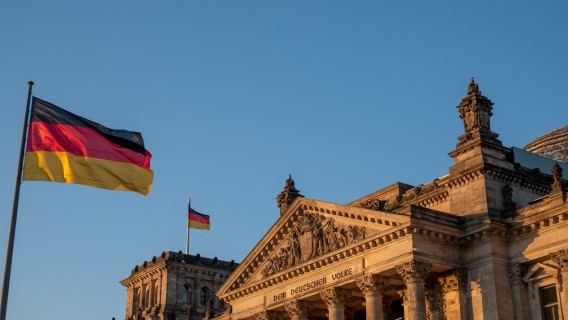Resume af teksten:
Den seneste Ifo-indeks for november viser, at den tyske økonomi stadigvæk står fast i stagnation, med indekset nede på 88,1 fra 88,4 i den foregående måned. Forværringen skyldes en nedjustering af fremtidige forventninger, selvom den nuværende vurdering viste en mindre bedring. Trods optimisme om Tysklands økonomi tidligere på året, er forventningerne drastisk blevet nedjusteret. 2025 har været præget af forhåbninger knyttet til massiv økonomisk stimulans fra regeringen, men også skuffelse over manglende strukturelle reformer og stigende politiske spændinger. Tysklands økonomi slæber fortsat under et langsigtet underskud i investeringer og mangler strategier til at øge konkurrenceevnen, mens det står over for nye globale udfordringer. På trods af de mange strukturelle problemer fastholder nogle økonomer håbet om, at den ventede statsfinansielle stimulans næste år vil kunne give økonomien et løft, selvom udfordringerne ikke forsvinder.
Fra ING:
With dropping expectations and an only somewhat improving current assessment, the November Ifo index suggests that the German economy remains deeply stuck in stagnation at year-end

Previous optimism about the German economy was swiftly corrected this year. Could some hope still linger for 2026?
Correcting earlier optimism
This does not really come as a surprise, but Germany’s businesses have downscaled their previous optimism. The Ifo index just came in at 88.1 in November, from 88.4, correcting a rather unexpected improvement last month. While the current assessment component increased somewhat, it was the expectations component that brought down the headline index. The combination of a still-weak current assessment component and reversed expectations is another example of an economy that remains deeply stuck in stagnation.
Still no convincing answer to structural challenges
Like U2 sang almost 40 years ago: the German economy still hasn’t found what it’s looking for. The year 2025 has been another year of hope and disappointed optimism. A year which saw excitement and enthusiasm sparked by Germany’s unprecedented fiscal policy U-turn and its decision to invest significantly in infrastructure and defence this spring. But also a year that brought a rude awakening and a cringing feeling as we watched the new government undermine the positive impact of fiscal stimulus with clumsy budgetary decisions, new political tensions, and a lack of structural reforms. The mood in Germany soured and optimism ground to a halt – and not just because of US tariffs or a stronger euro, both of which complicate matters for the export industry.
Recent weeks have brought new doubts about whether German policymakers have fully understood the new economic reality Germany is in. A reality in which Germany has lost international competitiveness as a result of long-term underinvestment, a portion of naivety and arrogance, and China’s rise from export destination to system rival. What, at least at first glance, still looks like helplessness and a lack of strategy to propel the German economy into the 21st century is increasingly weighing on both business and consumer sentiment.
The ketchup bottle dilemma
Despite the structural challenges and the sombre mood, the sheer scale of Germany’s announced fiscal stimulus – €500bn for infrastructure and a ‘whatever it takes’ stance on defence – remains a powerful argument against giving up too early on the German economy. In fact, the latest fiscal data suggests that the country is still suffering from this summer’s political struggle to agree on a budget for 2025. Many government expenditure categories fall short of reaching their annual targets.
For instance, despite an increase in October, direct military expenditures after the first 10 months of the year had not even reached 50% of the full-year target. The same holds true for other public investments. Assuming that this underspending is due to the budget woes of the summer – and not due to brinkmanship or an administration’s inability to bring the money to work – means that fiscal policies should finally push the economy out of stagnation next year.
At least for now, hope remains that fiscal stimulus in Germany could be like the good old ketchup bottle: initially, no matter what you do, nothing comes out of the bottle until suddenly the whole thing splashes out at once. It won’t make the structural problems go away, but it could at least be a reason to occasionally switch to another U2 song in Germany next year: it’s a beautiful day.
Hurtige nyheder er stadig i beta-fasen, og fejl kan derfor forekomme.







